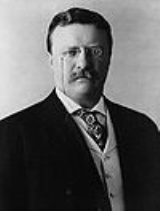
(1901–1909). He is noted for his exuberant personality, range of interests and achievements, and his leadership of the Progressive Movement
, as well as his "cowboy
" persona and robust masculinity
. He was a leader of the Republican Party
and founder of the short-lived Progressive ("Bull Moose") Party of 1912
.
1901 Vice President of the United States Theodore Roosevelt utters the famous phrase, "Speak softly and carry a big stick" at the Minnesota State Fair.
1901 President of the United States William McKinley dies after an assassination attempt on September 6, and is succeeded by Theodore Roosevelt.
1901 President Theodore Roosevelt officially renames the "Executive Mansion" to the White House.
1901 US President Theodore Roosevelt delivers a 20,000-word speech to the House of Representatives asking the Congress to curb the power of trusts "within reasonable limits".
1902 The U.S. Congress passes the Spooner Act, authorizing President Theodore Roosevelt to acquire rights from Colombia for the Panama Canal.
1902 Theodore Roosevelt becomes the first President of the United States to ride in an automobile.
1903 President Theodore Roosevelt sends a radio message to King Edward VII: the first transatlantic radio transmission originating in the United States.
1905 Russo-Japanese War: In New Hampshire, USA, the Treaty of Portsmouth, mediated by US President Theodore Roosevelt, ends the war.
1906 Theodore Roosevelt signs the Antiquities Act into law, authorizing the President to restrict the use of certain parcels of public land with historical or conservation value.
1906 U.S. President Theodore Roosevelt proclaims Devils Tower in Wyoming as the nation's first National Monument.
The light has gone out of my life.![]()
There is a curse on this house.![]()
I wish to preach, not the doctrine of ignoble ease, but the doctrine of the strenuous life.![]()
Far better it is to dare mighty things, to win glorious triumphs, even though checkered by failure, than to rank with those poor spirits who neither enjoy much nor suffer much, because they live in that grey twilight that knows neither victory nor defeat.![]()
Death is always and under all circumstances a tragedy, for if it is not, then it means that life itself has become one.![]()
I'm as strong as a bull moose and you can use me to the limit. ![]()

